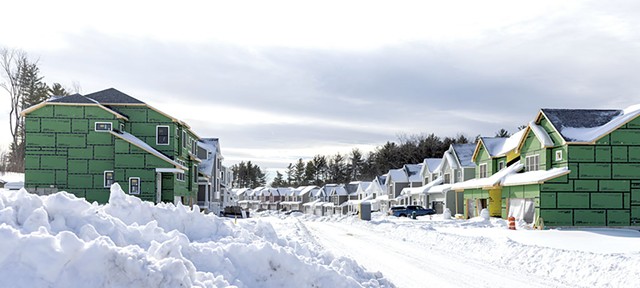
- James Buck
- Homes under construction at the O'Brien Farm development
Updated on February 27, 2022.
Developers Jeff Nick and Jeff Davis have sued the City of South Burlington and three city councilors over new land use regulations, which the developers claim would prevent them from building on roughly one-third of their 112-acre property at 835 Hinesburg Road.
The regulations, which passed earlier this month by a 3-2 city council vote after years of contentious negotiations, prohibit development in wildlife corridors, known as “habitat blocks.” The suit, filed Thursday in federal court through an LLC registered in Davis' name, alleges that the City of South Burlington relied on outdated satellite imaging to map the habitat blocks at 835 Hinesburg Road without conducting an in-person assessment of the land’s ecology. As a result, the suit claims, the habitat blocks lack scientific rigor, and the moratorium on development in those areas constitutes an unlawful seizure of their property.
Councilors Meaghan Emery, Helen Riehle and Tim Barritt, all of whom voted in favor of the new regulations, are named as defendants. The suit seeks monetary damages and an injunction barring the city from enforcing the regulations.
The developers' suit is the first legal challenge to South Burlington's new land use rules. Proponents, including Emery, Riehle and Barritt, have argued that the regulations protect critical natural resources and promote sustainable development in the face of the climate crisis. Critics, including affordable housing advocates and developers such as Nick and Davis, insist that the regulations will exacerbate Vermont’s housing crisis by restricting growth in the most populous region in the state.
During the February 7 South Burlington City Council meeting, Nick suggested that he was prepared to take the city to court.
“I don’t want to make this a legal thing, but it appears that that’s where we’re headed,” he said, addressing the councilors before they voted on the proposed regulations. Councilor Emery asked Nick if he was aware that a zoning change under the new regulations would allow him to build between 300 and 500 housing units on the Hinesburg Road property.
“I wouldn’t say 500,” Nick replied. “If you put commercial up front, which is what your city plan calls for, you’re not going to get 300 to 350 homes. You’ll get a lot less.”
According to Nick, whose original plans for 835 Hinesburg Road included commercial space, office buildings and a number of housing units, the planning commission supported his proposal when he first submitted sketches for the project in 2015. Seven years later, he said, the city's new land use regulations have sent him back to the drawing board. Nick objects, in particular, to the removal of 45 acres of his property — the so-called “habitat blocks” — from potential development.
“Right there, you have the interstate, you have Dorset Park with all those homes, you have Hinesburg Road, you have an industrial park across the street,” Nick told Seven Days in an interview on Friday. “This is not a wildlife habitat, not by any stretch of the imagination. But we can’t even remove rotten trees from it or put a fence up.”
 In the months leading up to the passage of the regulations, attorneys for the University of Vermont, the largest landowner in South Burlington, threatened legal action against the city if the new rules prevented the university from developing the 193 acres of its property located in habitat blocks. The loss of those assets, the university’s lawyers argued, would entitle UVM to compensation from the city. In response, the city tweaked the language of the regulations so that the university would be exempt from the habitat block restrictions, citing a state law that limits municipal oversight of projects proposed by entities such as the state, Champlain Water District, and UVM.
In the months leading up to the passage of the regulations, attorneys for the University of Vermont, the largest landowner in South Burlington, threatened legal action against the city if the new rules prevented the university from developing the 193 acres of its property located in habitat blocks. The loss of those assets, the university’s lawyers argued, would entitle UVM to compensation from the city. In response, the city tweaked the language of the regulations so that the university would be exempt from the habitat block restrictions, citing a state law that limits municipal oversight of projects proposed by entities such as the state, Champlain Water District, and UVM.
The developers' suit contends that Councilor Emery, a French professor at UVM, should have recused herself from voting on the regulations. “To confer a special favor on her employer by saying that the rules that apply to us don’t apply to them seems like a real conflict of interest,” Nick said in an interview.
Had Emery abstained, the suit claims, the motion to adopt the regulations wouldn’t have received the three votes required to pass. Another councilor, Thomas Chittenden, is also a professor at UVM. He voted against the regulations, and the lawsuit does not mention his employment at the university as a conflict of interest.
Emery declined to comment on the suit and the developer's allegations of a conflict of interest. Barritt, too, declined to comment; Riehle, the city council chair, and Jessie Baker, the South Burlington city manager, did not immediately respond to interview requests.
Read the entire suit below:
Developers Jeff Nick and Jeff Davis have sued the City of South Burlington and three city councilors over new land use regulations, which the developers claim would prevent them from building on roughly one-third of their 112-acre property at 835 Hinesburg Road.
The regulations, which passed earlier this month by a 3-2 city council vote after years of contentious negotiations, prohibit development in wildlife corridors, known as “habitat blocks.” The suit, filed Thursday in federal court through an LLC registered in Davis' name, alleges that the City of South Burlington relied on outdated satellite imaging to map the habitat blocks at 835 Hinesburg Road without conducting an in-person assessment of the land’s ecology. As a result, the suit claims, the habitat blocks lack scientific rigor, and the moratorium on development in those areas constitutes an unlawful seizure of their property.
Councilors Meaghan Emery, Helen Riehle and Tim Barritt, all of whom voted in favor of the new regulations, are named as defendants. The suit seeks monetary damages and an injunction barring the city from enforcing the regulations.
The developers' suit is the first legal challenge to South Burlington's new land use rules. Proponents, including Emery, Riehle and Barritt, have argued that the regulations protect critical natural resources and promote sustainable development in the face of the climate crisis. Critics, including affordable housing advocates and developers such as Nick and Davis, insist that the regulations will exacerbate Vermont’s housing crisis by restricting growth in the most populous region in the state.
During the February 7 South Burlington City Council meeting, Nick suggested that he was prepared to take the city to court.
“I don’t want to make this a legal thing, but it appears that that’s where we’re headed,” he said, addressing the councilors before they voted on the proposed regulations. Councilor Emery asked Nick if he was aware that a zoning change under the new regulations would allow him to build between 300 and 500 housing units on the Hinesburg Road property.
“I wouldn’t say 500,” Nick replied. “If you put commercial up front, which is what your city plan calls for, you’re not going to get 300 to 350 homes. You’ll get a lot less.”
According to Nick, whose original plans for 835 Hinesburg Road included commercial space, office buildings and a number of housing units, the planning commission supported his proposal when he first submitted sketches for the project in 2015. Seven years later, he said, the city's new land use regulations have sent him back to the drawing board. Nick objects, in particular, to the removal of 45 acres of his property — the so-called “habitat blocks” — from potential development.
“Right there, you have the interstate, you have Dorset Park with all those homes, you have Hinesburg Road, you have an industrial park across the street,” Nick told Seven Days in an interview on Friday. “This is not a wildlife habitat, not by any stretch of the imagination. But we can’t even remove rotten trees from it or put a fence up.”
Related Despite a Housing Crisis, South Burlington’s City Council Adopts Regs to Slow Rural Development

Despite a Housing Crisis, South Burlington’s City Council Adopts Regs to Slow Rural Development
By Chelsea Edgar
Development
The developers' suit contends that Councilor Emery, a French professor at UVM, should have recused herself from voting on the regulations. “To confer a special favor on her employer by saying that the rules that apply to us don’t apply to them seems like a real conflict of interest,” Nick said in an interview.
Had Emery abstained, the suit claims, the motion to adopt the regulations wouldn’t have received the three votes required to pass. Another councilor, Thomas Chittenden, is also a professor at UVM. He voted against the regulations, and the lawsuit does not mention his employment at the university as a conflict of interest.
Emery declined to comment on the suit and the developer's allegations of a conflict of interest. Barritt, too, declined to comment; Riehle, the city council chair, and Jessie Baker, the South Burlington city manager, did not immediately respond to interview requests.
Read the entire suit below:







Comments
Comments are closed.
From 2014-2020, Seven Days allowed readers to comment on all stories posted on our website. While we've appreciated the suggestions and insights, right now Seven Days is prioritizing our core mission — producing high-quality, responsible local journalism — over moderating online debates between readers.
To criticize, correct or praise our reporting, please send us a letter to the editor or send us a tip. We’ll check it out and report the results.
Online comments may return when we have better tech tools for managing them. Thanks for reading.